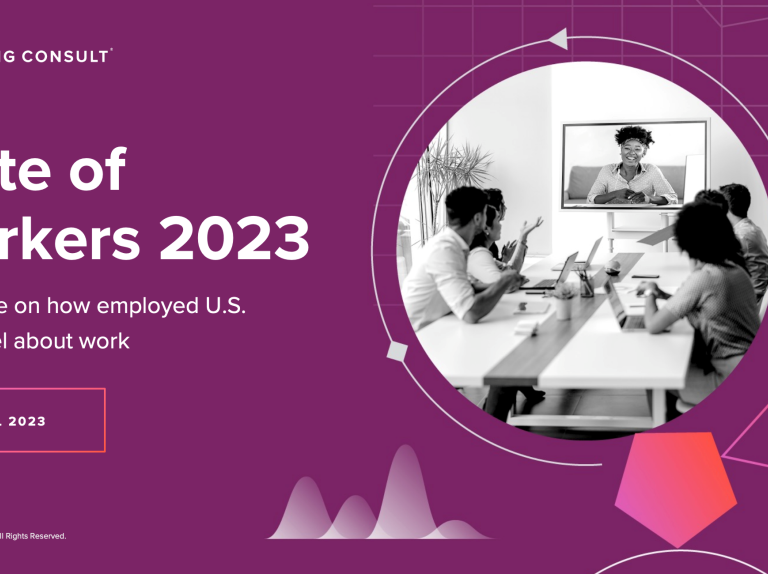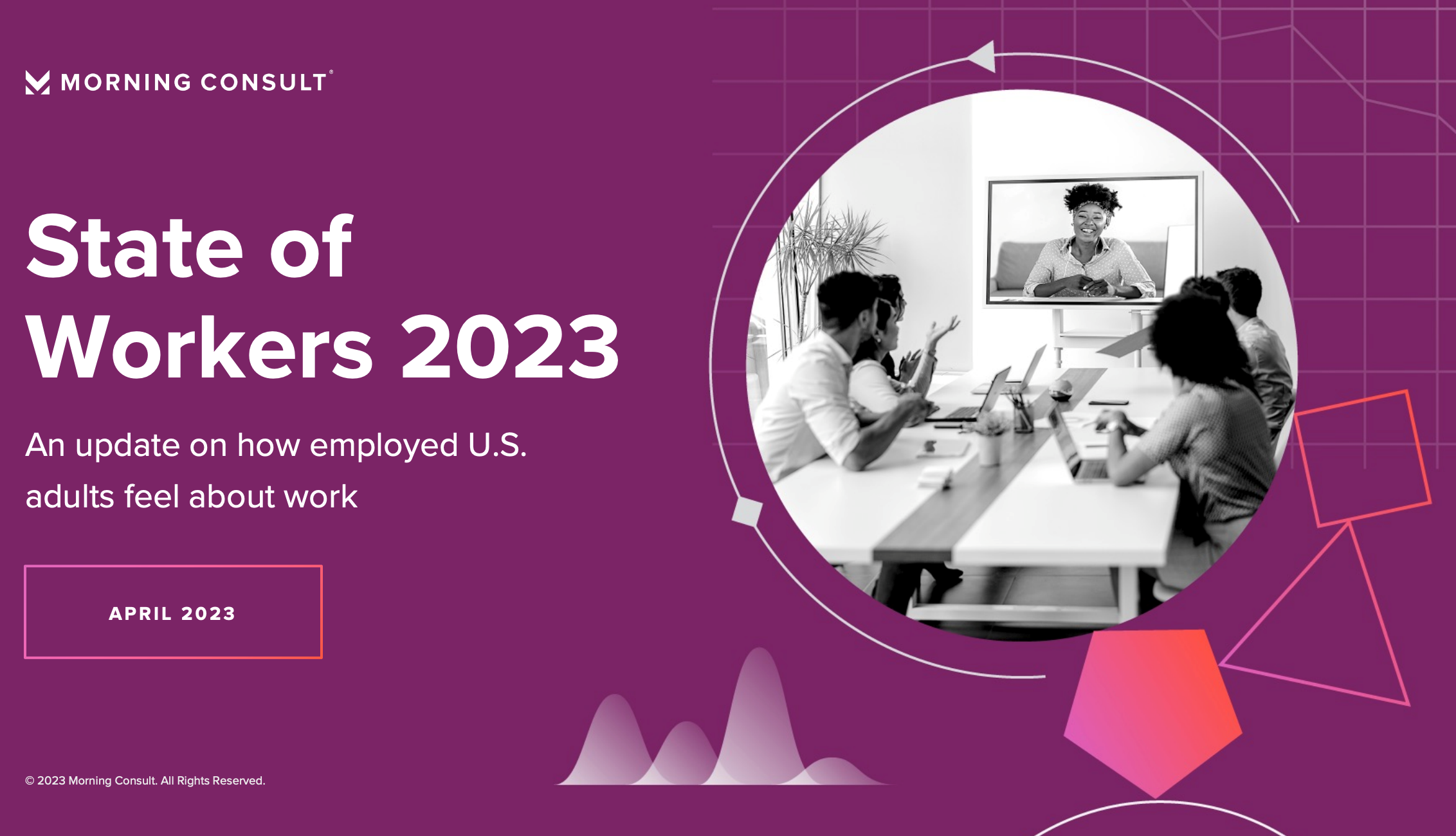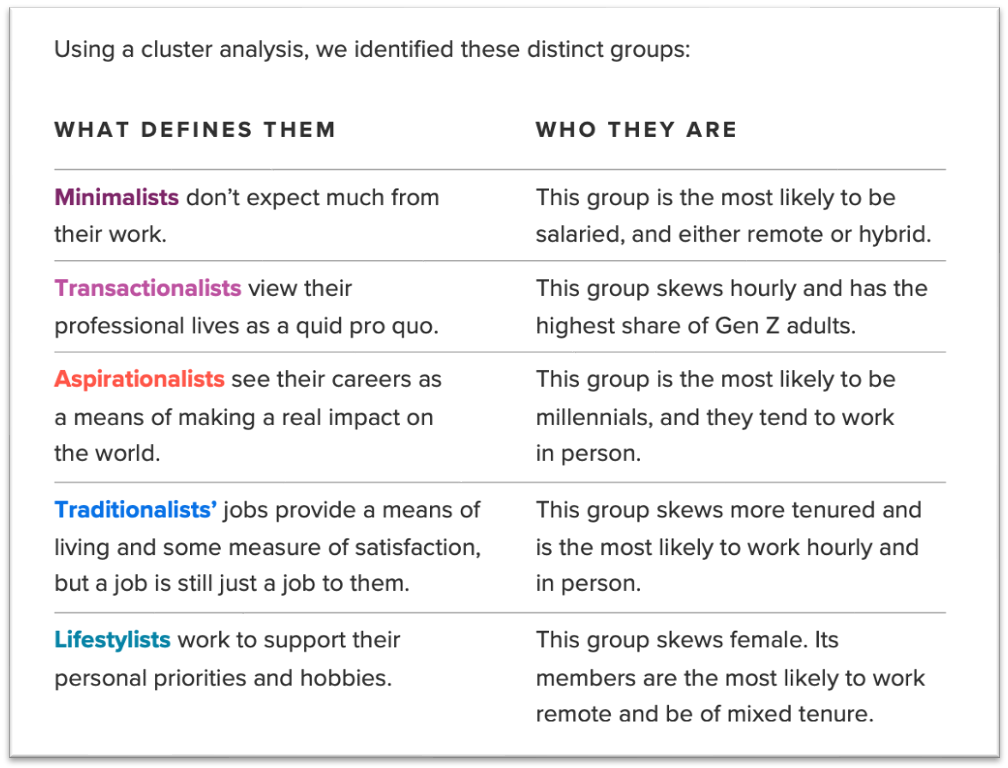
Morning Consult’s latest report looks at how the economy and a shifting workforce have impacted Americans’ work preferences, and how attitudes have changed over the past 12 months.
On the pandemic’s third anniversary, work priorities continue to shift. Morning Consult’s latest report looks at how the economy and a shifting workforce have impacted Americans’ work preferences, and how attitudes have changed over the past 12 months. While focused on the United States their findings extend beyond the US border.
Their research covers where people are working, how satisfied they are with their job and whether employers face a retention threat. To find these answers they surveyed 6,610 Americans, including roughly 3,500 employed adults. The result is the State of Workers 2023: An update on how employed U.S. adults feel about work (April 2023).

Morning Consult’s three key findings are as follows along with some points I pulled out of the data.
1. Remote work has lost some of its luster.
Predictions by many that the future of work would be entirely remote never came to fruition. Not only has the share of U.S. adults working remotely dipped compared with last year, but pluralities still prefer to work in person. And some remote employees say completing work tasks at home is more difficult.
- Fewer Americans are working remotely now (23%) compared with 2022 (27%).
- Twice as many workers wish to have a hybrid scenario (25%) than do (12%).
- Gen Z adults shows the strongest overall preference for working in an office.
- A higher share of Gen Z adults who have worked remotely said communicating with their manager is harder when away from the office (32% vs. 26% for all employed adults).
- For workers who prefer the office, productivity is the biggest reason why.

- Companies with in-person work policies should take note of what gives people pause about coming to an office. Top reasons include not wanting to commute, not liking the work-life balance and being able to schedule appointments such as doctor's visits and home repairs.
2. It’s more of an employer’s market now.
Last year, employees enjoyed a high degree of bargaining power they had not had in decades, demanding workplace flexibility and other perks. But the tables have turned, if only slightly. Job satisfaction is high, and job-hopping is down, but people still feel exhausted by work.
- Roughly three-quarters of adults (73%) said they always, often, or sometimes feel too tired after work to enjoy the things they like to do in their personal lives — hardly an improvement over the 74% who said the same last year.
- When asked how often they feel too tired to enjoy their personal lives after work, 81% of Gen Zers said always, often, or sometimes, compared with 73% of all adults.
- When asked how well their current job aligns with their career goals, 27% of Gen Zers said not well, compared with 21% of all adults who said the same.

- Workers are modestly deprioritizing nearly every aspect of their work life that they considered important just last year except for having a high-paying career or profession.
- Fewer workers are interested in leaving their job, but feelings of being underpaid persist.
- Gen Z adults are unique in that several considerations by potential job seekers became more important to them, including workforce diversity and education and health benefits.
3. Despite the headlines, job losses are low.
Even though coverage of layoffs is at a fever pitch, the share of workers being laid off in the broader economy remains low, and voluntary separations are historically high. That said, employees are putting in longer hours, and many are feeling tired after work.
- When asked how much they’ve worked on average over the last few months, 58% said more than 35 hours a week, which is up from the 52% who said the same in 2022. The difference was starker for salaried employees: 60% in 2022 versus 70% in 2023.
- When asked how often they feel too tired to enjoy their personal lives after work, 81% of Gen Zers said always, often, or sometimes, compared with 73% of all adults.

- In 2023, the makeup of our five groups in the workforce hasn’t shifted too much, though there are two notable changes - more Transactionalists, fewer Lifestylists.

- Transactionalists now make up a larger share of the U.S. workforce, likely because they are our youngest cohort of workers, and more of the workforce is now made up of Gen Z adults.
- In addition, remote work options becoming less important to employed adults overall is the biggest reason we’re seeing a decrease in the Lifestylist group, whose members are most strongly defined by flexibility in their work location.
There is a lot more in this report including deep dives into the attitudes of Gen Z workers, hourly vs. salaried workers and employed caregivers. These are very worth a look.


